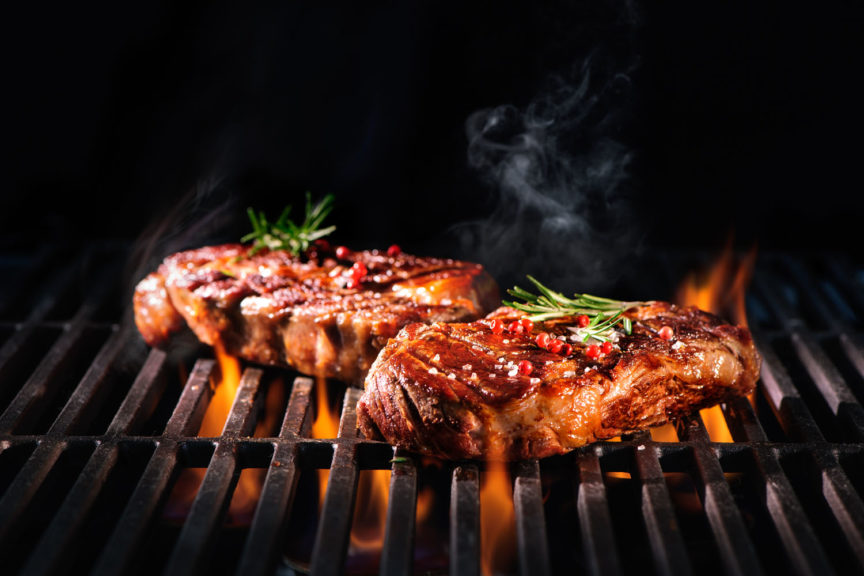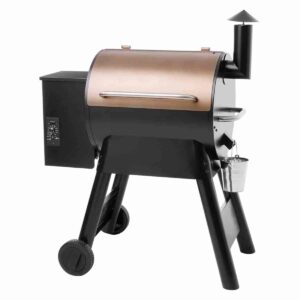Seasoning a Steak
Steak is one of the most popular things to grill and is a favorite protein of many people. Some say that a good cut of steak only needs salt and pepper, but you may want to experiment with other spices, rubs, and marinades to create unique flavors.
Should I Season My Steak Before Grilling?
A steak should always be salted prior to being cooked on the grill. Any other rubs or marinades should be also be applied prior to cooking. There are several reasons for this:
- It tenderizes the meat by breaking down the proteins
- It makes the meat take on the flavor of the seasoning
How to Season a Steak
- Make sure your steak is at room temperature. This will make it cook quicker and more evenly since there won’t be a variety of internal temperatures.
- Apply your seasoning and then allow the steak to rest. Salt draws moisture to the surface of the steak so letting the steak sit for 30 minutes allows some moisture to return.
- When marinating a steak, cut a few small slits into the meat. This allows the marinade to get absorbed into the steak.
- Rub the marinade into the meat.
- Leave the meat to rest for about an hour before cooking.
- Don’t marinate too long or the meat will absorb all the spices from the marinade and lose the flavor of the steak. It could also cause the meat to become too soft and fall apart.
- If you’re only using salt, use coarse-grained Kosher salt, not table salt.
- Season the steak with ¾ – 1 teaspoon of salt per pound.
- Salt generously on both sides to provide enough seasoning for each bite.
- Salt the edges of the steak and make sure to press the salt into the meat so it doesn’t fall off.
- Pat your steak dry before grilling. A dry steak helps form a nice crust when cooked.
The Pepper Debate
Some say that applying pepper to a steak before grilling will cause the pepper to burn and result in a bitter or burnt flavor. However, others say it gives a deeper flavor to the steak. You’ll have to experiment with both and see which you prefer.
Whenever you choose to apply pepper, use fresh peppercorns ground in a pepper mill instead of pre-ground pepper that can get stale. You’ll be able to taste a significant difference.
What to Put on Steaks Before Grilling
Now that you know how to apply your seasonings, the question is what to use? Beyond salt and pepper, there is an almost infinite amount of spice combinations to be used.
You can make your own using a combination of spices that are already in your kitchen cupboards. Or you can buy a pre-mixed seasoning such as those from McCormick which are available at almost any grocery store.
Here are some of the most popular seasoning combos from McCormick’s and their main ingredients:
McCormick Perfect Pinch Steak
- Salt
- Onion
- Garlic
- Black pepper
- Paprika
- Celery seed
McCormick Grill Mate’s Montreal Steak Seasoning
- Coarse salt
- Peppers (including black pepper and red pepper)
- Garlic
- Onion
- Sunflower oil
- Paprika
McCormick Brown Sugar and Bourbon
- Salt
- Brown sugar
- Dried Cane Syrup
- Tomato
- Garlic
- Onion
- Red bell pepper
- Molasses
- Paprika
- Vinegar
- Tamarind
- Malted Barley Whiskey Extracts
McCormick Grill Mate’s Smokehouse Maple Seasoning
- Sugar
- Salt
- Brown sugar
- Onion
- Garlic
- Maple syrup
- Red bell pepper
- Orange peel
- Paprika
- Molasses
- Chili pepper
- Smoke flavor
You can mix your own to create a unique blend customized to your flavor preferences. Some popular homemade rubs include:
Simple Seasoning – salt, pepper, onion powder, garlic powder
Herbes de Provence – dried thyme, marjoram, rosemary, oregano, or sage
Spicy Rub – salt, pepper, onion powder, paprika, crushed red chili flakes
How Do You Add Flavor to Chicken?
Chicken is another popular protein choice and can easily be grilled. But how do you add flavor to meat that has such a light and delicate taste?
Because chicken does have such a mild flavor, it can easily be enhanced with different seasonings, rubs, and marinades. This allows you to experiment with various recipes and the chicken will take on the flavor of whatever you add to it.
A dry rub of seasonings will form a crust on the exterior and help seal in moisture. For a savory seasoning, mix your favorite spices with some salt and apply to clean and dry chicken.
Although you can add just about anything to chicken, there are some flavors that pair better with it than others. Two types of flavor that taste best on chicken are herbs and citrus:
Some of the best herbs to use are:
- Cilantro
- Dill
- Marjoram
- Parsley
- Thyme
- Rosemary
- Sage
To get a strong citrus flavor, use:
- Lemon – this is a classic flavor when paired with chicken
- Lime – lime can be overpowering but you can balance it with chili
- Orange – orange peel or juice can be used to add a tangy zest
- Lemon pepper – this gives the chicken a light and refreshing flavor
You can also easily purchase seasonings for chicken that have already been mixed. Two popular ones are:
McCormick’s Perfect Pinch Italian Seasoning
- Marjoram
- Thyme
- Rosemary
- Sage
- Oregano
- Basil
McCormick’s Poultry Seasoning
- Thyme
- Sage
- Marjoram
- Rosemary
- Black pepper
- Nutmeg
As you can see, even the store-bought seasonings have herbs as their primary ingredient so it’s easy to make them yourself if you have a well-stocked spice cupboard.
Easy Grilled Chicken Recipe
To make deliciously seasoned grilled chicken, follow these simple steps:
- Make sure the chicken is thawed
- Pound it out so it cooks evenly
- Add your seasoning to the meat
- Rub the seasoning in so it sticks to the chicken
- Make sure your grill is hot
- Oil the grates so it doesn’t stick
- Grill evenly on both sides
- For more flavor, sprinkle some additional spices on after it is cooked
Marinating Chicken
Chicken also does well when seasoned with a brine or marinade to pack it full of flavor and keep it moist and juicy inside.
Acid-based marinades, such as those with vinegar, citrus, or salt can help tenderize the meat. However, the chicken should not be left in a marinade too long or it will soften the meat too much.
Other marinade options have a neutral base such as mayonnaise, milk, cream, or other vegetable ingredients.
Boneless chicken can be marinated anywhere from 30 minutes up to several hours while bone-in chicken can marinate much longer, even up to 12 hours. Make sure your chicken is covered in the marinade and chilled while it marinates. If you’re using the plastic bag technique, remember to turn the chicken every few hours so it marinates evenly.
Some simple marinades and classic combinations include:
- Soy sauce and ginger
- Teriyaki sauce
- Honey mustard
- Garlic and rosemary
You can also make your own marinade by grabbing one of the following ingredients to mix and match:
- Oil – depending on the flavor you want, try coconut, olive, sesame, or peanut oil
- Salt and pepper – coarse-grained and fresh is always best
- Fresh flavors – garlic, ginger, onion, leek, scallion, shallots
- Dried herbs – rosemary, sage, thyme, oregano
- Sweetener – honey, maple syrup, molasses, sugar, brown sugar
- Other sauces – soy sauce, tamari, Worcestershire sauce
- Citrus – lemon, lime, orange, pineapple
- Fresh herbs – basil, cilantro, dill, chives, parsley
- Spice – hot sauce, paprika, chili powder, red chili flakes
What Flavors Go Well With Pork?
Pork is really versatile and known for its depth of flavor. It can take on many different spices and flavors, depending on your personal tastes.
There are several spices that pair really well with it and enhance the natural taste. From herbs and spices to fresh aromatics, many traditional flavors bring out the best when cooked with pork.
Some popular spices and flavors include:
- Herbs – marjoram, oregano, basil, parsley, rosemary, thyme, sage are delicious with pork
- Spices – paprika, cloves, allspice, and caraway all give a unique flavor
- Mustard – if you’re a mustard lover, definitely try it with pork as a glaze or in a marinade
- Ginger – fresh ginger is quite pungent but cooking it with pork will smooth it out
- Garlic – garlic pairs really well with pork and gives it a flavorful kick
Seasoning Grilled Pork Chops
Because pork chops are one of the most popular cuts and are popularly grilled, let’s take a look at some ways to season them.
Spices and Rubs
Start by defrosting your chops and allowing them to thaw out.
Take your favorite spices or spice mix and sprinkle it evenly over the pork
If you’re using brown sugar in your rub, try not to let it clump when rubbing the spice in to avoid burning when grilled
Marinades
Pork is quite lean so a marinade can help tenderize it and add some flavor. Making a simple marinade with a soy sauce base will allow the saltiness from the sauce inject a lot of flavor into your meat. Then add any other spices to create a delicious sauce.
Place the chops in a bag and pour in your marinade. Massage the liquid into the meat so it gets evenly coated. Then let it marinate in the fridge for up to a day. If you’ve only got 30 minutes, even that short amount of time will make a difference in flavor.
However, the thicker your chop, the longer it will need to marinate. Use any leftover liquid that is not absorbed to baste the chops as you grill them.
Check out our Recent Posts
Z Grills Review
If you’re looking for a grill that will last, Z Grills is the way to go. Z grills are made of the best quality materials...
Read MorePit Boss Pellet Grill Review
Pit Boss is one of many when it comes to manufacturers of wood pellet grills and smokers. If you have spent any amount of time...
Read More10 Fun Benefits of Taking an Online Cooking Class
There’s never been a better time to take an online cooking class. With the continued popularity of online learning, there are more and more exciting...
Read More



